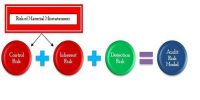Principles of Generally Accepted Auditing Standards (GAAS)
GAAS means Generally Accepted Auditing standards; are sets of standards against which the quality of audits are performed and may be judged. Several organizations have developed such sets of principles, which vary by territory. It is developed by AICPA 1947.
The principles have been divided into three parts.
General standards:
- The audit is to be performed by a person or persons having educated technical training and proficiency as an auditor.
- The auditor should be independent in mental attitude in relating to the assignment.
- The auditor must have due professional care in the planning and preparation of the report.
Standard of fieldwork:
- The work is to adequately plan and assistant is to be properly supervised.
- A sufficient understanding the internal control is to be obtained to plan the audit and to determine the nature timing and extent of tests to be performed.
- Sufficient competent evidential matter is to be obtained through inspection, observation, inquiries, and consternation.
Standard of reporting:
- The report of financial statement shall state in accordance with GAAP.
- The report shall identify those circumstances in which such principles have not been consistently observed in the current period in relation to the preceding period.
- Informative disclosures in the financial statement are to be regarded as reasonably adequate.
- The report shall contain an expression of opinion regarding the financial statement.














